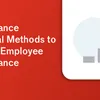Conducting performance appraisals during the pandemic
Conducting performance appraisals during the pandemic is a fine balancing act where you need to meet the expectations of the high-performers while simultaneously taking care of those at the other end of the spectrum.
As we are facing difficult and uncertain times, it becomes a difficult and sensitive task to conduct performance assessments during the pandemic. During this period, maintaining business processes undisturbed is a challenging thing to do. HR has the unenviable job of managing a range of tasks during this uncertainty, from crisis planning to maintaining smoothness in communication and operations.
Organisations must, therefore, ensure that employees can work to maintain some semblance of normalcy with minimal disruption. Sometimes, a good way to have some degree of control and shut out the rest of the world is to immerse yourself in your work.
However, now the question arises: "During this crisis, are performance evaluations still necessary?"
The purpose of performance appraisals
Performance appraisals are carried out so that managers can understand what the employees' strengths and weaknesses are and how they can provide their employees with the best help to grow and solve any problems they might have.
Evaluation is also a good instrument to measure the differences between low-performing and high-performing employees and to measure the employees' average skill set.
These evaluations are the basis of important criteria like bonuses, promotions, and potential for further training. This method was tried, tested, and worked under normal circumstances. However, now the circumstances have changed drastically and organisations should re-evaluate should they be conducting performance appraisals during the pandemic.
We have come up with a few options that you may want to look at to decide how you may want to conduct appraisals going forward.
Option 1: Remove performance reviews entirely
Performance appraisals are time- and manpower-consuming processes that can be carried on, especially during a pandemic where everyone may not have a clear communication line. Inputs from colleagues, managers, and a clear explanation of the methods and benchmarks used are required for the performance appraisal.
Extenuating circumstances that can adversely affect the staff must also be taken into account by the managers. Combined with the fact that performance assessments may not be fair to everyone, these conditions mean that abandoning or at least delaying performance assessments during the pandemic may not be a terrible option and may ease some employee pressure.
Counterpoint: For managers to make meaningful decisions in the future, performance appraisals are also a source of valuable data.
Scrapping performance appraisals can also mean scrapping bonuses linked to such appraisals, for instance, bonuses or extended holidays, which can anger high-performing employees who suddenly have no reason to continue performing at their current efficiency ratio, resulting in less manpower at a time when the organisation needs all the effort it can get.
Even if performance problems are identified, the managers may not be able to provide the employees with adequate support. If you are unable to provide support to the low-performing employees who need it, then the whole situation can snowball out of control.
Option 2: Relax or lighten the performance review criteria
Employees may have to deal with some mental or physical stress in such trying situations, and may not be able to perform at their full capacity. In such a case, relaxing certain performance goals and criteria could be beneficial for managers so that employees have some time to breathe and do their job at a pace they are comfortable with.
Of course, in cases where you relax performance criteria, the bonuses bundled with such appraisals must also be relaxed or deferred. Also, reducing working hours or assigning low priority tasks to those who are struggling would be a good strategy, or giving everyone the same bonuses and benefits for some time regardless of performance.
What about bonuses?
No bonuses
In some cases, it might be better for the company to simply remove, or at least, defer bonuses from the appraisals. In some other instances, the organisation may not even have a choice in this matter, as financial constraints can put a squeeze on profits and lead to cost-saving measures across the board.
Needless to say, employee morale and retention will be harmed by this.
Same bonuses for everyone
Another viable approach is to equalise bonuses and benefits for everyone, eliminating pressure from low-performing employees. You have to ensure, however, that this does not become a habit for employees. This method could lead to employees believing that lower-skilled work at the same level as high-skilled work is acceptable or even rewarded. It also results in higher-skilled employees feeling left out and treated unfairly.
Conclusion
In conducting appraisals during this pandemic, there is no right or wrong option. You are going to face detractors, whatever option you choose, such are the times that we live in. You should strive to ensure as many employees as possible should benefit while the marginalised don't suffer too much.
(Disclaimer: The views and opinions expressed in this article are those of the author and do not necessarily reflect the views of YourStory.)








